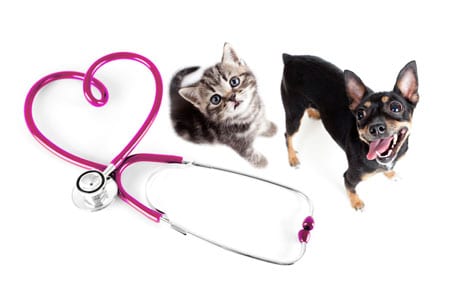 So you’re on the phone scheduling your furbaby’s wellness visit at the vet, and the receptionist on the other end of the line gives you a homework assignment: bring in a fecal sample from your pet to your appointment. So what now?
So you’re on the phone scheduling your furbaby’s wellness visit at the vet, and the receptionist on the other end of the line gives you a homework assignment: bring in a fecal sample from your pet to your appointment. So what now?
At Harmony Animal Hospital, we place great importance on the comfort and health of your animal companions, and fecal exams are a critical piece of the pet wellness puzzle. Read on for a rundown on why we request pet fecal samples, plus a few tips on how to collect, store, and deliver the best bag of poo for the veterinarian to put under the microscope.
Why Are Fecal Exams Important?
Fecal exams are important because it’s the best way to screen for intestinal parasites that can cause anemia, weight loss, bloating, intestinal blockage, and even death in affected animals.
Kittens and puppies often contract intestinal parasites from their mothers while they’re nursing, and adult pets can get several types of parasites through contact with other animals and contaminated soil and water. Usually, animals who get intestinal parasites contract them by accidentally consuming microscopic eggs or larvae, which then hatch and take up residence in the intestinal tract.
According to Kansas State University, up to 34% of dogs are infected with intestinal parasites. Kitties are also at risk for belly bugs that can cause illness, and North Carolina’s cats are at moderate risk for two major types of intestinal worms. And it’s not just your pets who may suffer: for example, roundworm infection is relatively common among people, and it can cause stomach pain, pneumonia, and even spontaneous blindness. That’s just one reason that keeping your pets pest-free is important for the whole family!
What Parasites Do Fecal Exams Screen For?
Here are a few of the parasites that fecal exams screen for:
- Hookworms: These microscopic worms feed on blood by attaching to the intestinal wall.
- Roundworms: Also called nematodes, roundworms are parasites that can cause anemia, vomiting, intestinal damage, and weight loss, but many times infected animals show no symptoms. Nearly all dogs and cats become infected with roundworms at some point during their lives.
- Whipworms: Whipworms are a significant threat to pets who contract them. This parasite can cause anemia, weight loss, and even death.
- Giardia: This parasite can infect dogs, cats, and humans, and can cause vomiting, diarrhea, gas, and other problems. However, not all animals with giardia have symptoms.
- Coccidia: There are 6 species of coccidia-type parasites that infect dogs and cats. Coccidiosis can cause diarrhea, weight loss, and (in extreme cases) hemorrhaging and death.
Parasites in the gut can affect your pet’s health and quality of life, even if you have indoor pets. Fecal screening is important because intestinal parasites are microscopic and do not always cause obvious symptoms.
What’s the Best Way to Collect and Store My Pet’s Poop Sample?
Now that you’re convinced (we hope!) that fecal screening is important, let’s get down to the nitty-gritty: how to collect a sample. It’s not a glamorous job, but there are a few ways to keep it simple and ensure that the vet has what he or she needs.
- Fresher is better. If at all possible, collect the poop sample the day of the wellness appointment. Larvae and eggs of parasites become difficult to recognize the longer they are outside of your pet’s body, so in order to make a correct diagnosis, the vet needs the freshest poop you can get.
- Make sure it’s your pet’s poop! If you have multiple pets or take your dog to the park to collect a sample, make sure you end up collecting the poop of the pet who’s headed to the vet.
- Bring enough poop. It’s not necessary to bring in a whole collection of different poops, but the vet will need at least 3-5 grams, which is less than 1 once, in order to determine what’s going on in your pup or kitty’s intestines.
- Select a good storage container. When collecting a pet’s fecal sample, it’s important to use a bag or other container that’s never been used for anything else. Don’t use yesterday’s sandwich bag or a pickle jar! The best bet is a fresh, sealable bag. If you need to store the sample overnight, you can put it in the fridge, but in that case it’s a good idea to double-bag the sample so that you can avoid contaminating anything in your kitchen.
Fecal samples are just one of the tools we use daily to ensure your furbabies’ health and wellness, and it’s so much simpler if you bring it with than if you have to go back and get one later.


